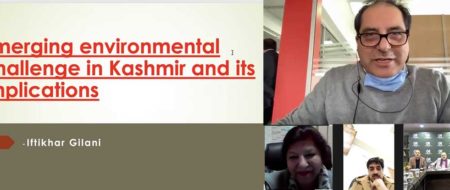‘Global Oil Crisis Amidst COVID19 & its Impact on Shipping Sector: Challenges and Prospects for PNSC’
Pakistan can save US$5-6bn annually by utilizing PNSC as its mainstay in oil freight: Cdre (r) Obaidullah
Pakistan can save around US$5-6 billion annually merely by
using Pakistan National Shipping Corporation (PNSC) as a mainstay of its
international maritime trade, while also allowing the national flag carrier to
buy more oil carriers and tankers in order to increase its capacity of
transporting liquid freight.
The recommendation was made by Commodore (r) Syed Muhammad
Obaidullah, former executive director of PNSC, who has also served as the
founding director of National Centre for Maritime Policy Research (NCMPR), in
an exclusive webinar talk ‘Global Oil Crisis Amidst COVID19 and its Impact on
Shipping Sector: Challenges and Prospects for PNSC’, organized by IPS on April
22, 2020.
Explaining the reasons of the current oil crisis, the expert
said that the chaos started with the conflict between Russia and the Kingdom of
Saudi Arabia over oil supply. Though the conflict got resolved due to the
intervention of the US president, the outbreak of COVID19 pandemic soon
rendered the resolution almost irrelevant. With no air operators, no transport
and no rail services in function and the lowest level of industrial
productivity that followed, the demand for oil reduced significantly. The
development had a severe impact on the oil markets around the globe in general,
and the US oil market (WTI) and Canadian oil market in particular, owing to
storage capacity issues at both suppliers’ and buyers’ end. The oil prices in
these markets as a result fell into negatives, affecting a number of industries
globally, including the shipping industry.
Speaking of any advantages of reduction in oil prices for
Pakistan, the speaker opined that the situation may not benefit the country at
all. Pakistan buys crude oil of Brent and Dubai crude, which though stands at
around US$15-20 per barrel at present, the very low demand of oil within the
country following the pandemic may not let it gain much. Three of its five oil
refineries are shut down due to exhaustion of their storage capacities and low
market demand. Another crisis for them is the new regulation of International
Maritime Organization (IMO) introduced in January 2020, which requires diesel
to have Sulphur content of 0.5% instead of 3.5% – inability of which has
hindered the processed oil exports of Pakistani refineries considerably, he
added.
Explaining the situation at length, Obaidullah briefed that
Pakistan has been importing three types of oils: Crude oil (11 million tons annually),
processed oil (12.5 million tons annually) and LNG (3-4 million tons annually).
This situation however, according to the speaker, was now changing slightly as
most of the IPPs in the country had shifted to LNG already.
The speaker told that Pakistan National Shipping Corporation
(PNSC) had been earning more than PKR2.5 billion as net profit annually
continuously for the last 20 years despite the slump in the global shipping
sector. The corporation initially was same as other trembling SOEs (State-Owned
Enterprises) till 2000s and its share price was only Rs.1.50, but it rose to
Rs.150 within just one year owing to some good decisions taken by the
management of that time.
Cdre (r) Obaidullah lamented that the present
international trade volume of Pakistan is around 100 million tons annually and
only 15 per cent of it was being carried by PNSC. In case of oil and energy
transportation, he bemoaned, 100 per cent freight of the country is being
handled by international carriers, which is costing the country around US$5-6
billion annually. The country however can save this enormous amount – which he
pointed as being equivalent to the recent IMF’s Extended Fund Facility (EFF) that
Pakistan is set to get in 39 months – merely by assigning the carrying of its
international trade to PNSC as well as by letting the corporation buy more
crude oil carriers and processed oil tankers in order to increase its carrying
and transporting capacity.












